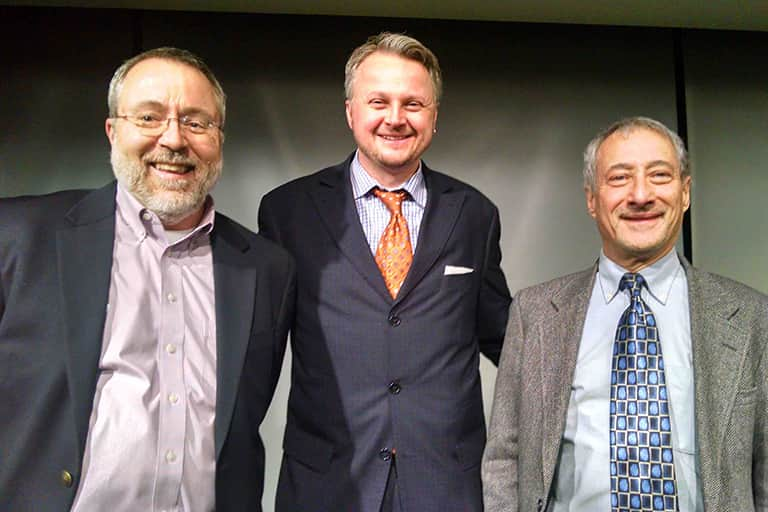Three Pulitzer Prize-winners from the J-School took part in recent events in Washington, D.C., commemorating the centennial of the prestigious awards in journalism, literature and music. M.L. Elrick, ‘90, won a 2009 Pulitzer for Detroit Free Press coverage of then-Detroit Mayor Kwame Kilpatrick’s corruption scandal.
The Pulitzer judges cited Elrick and Free Press colleague James Schaefer for “their uncovering of a pattern of lies by Mayor Kwame Kilpatrick that included denial of a sexual relationship with his female chief of staff, prompting an investigation of perjury that eventually led to jail terms for the two officials.”
Elrick is now a reporter at Fox 2 News (WJBK TV) in Detroit and a member of the of the MSU College of Communication Arts & Sciences alumni board.
As reporters in the Detroit News Lansing Bureau, James Mitzelfeld, ‘84, and J-School Professor Eric Freedman won their 1994 Pulitzer for coverage of a corruption scandal in the Michigan legislature.
Judges cited their “dogged reporting that disclosed flagrant spending abuses at Michigan's House Fiscal Agency.”
Mitzelfeld is now senior counsel in the Office of the Inspector General at the U.S. Justice Department in Washington, At MSU, he was editor-in-chief of the State News and a Capital News Service correspondent.
At the time of their prize-winning reporting, Freedman was a J-School adjunct faculty member. He joined MSU full-time in 1996 and is now Knight Chair, director of the Knight Center for Environmental Journalism and director of Capital News Service.
In October, the J-School will be involved in another Pulitzer Centennial event, this time in Lansing.
A partnership of the Michigan Humanities Council, Michigan Interscholastic Press Association and the J-School will create a high school-level competition for journalism students to work with Michigan Pulitzer winners at the MIPA fall conference.
Schools will hold competitions and choose a student piece for professional journalists to judge. The winners will earn a travel scholarship to attend the conference and will work in small classroom settings with the journalists.
It’s part of a national Pulitzer Campfires initiative by the Pulitzer Prize Board and Federation of State Humanities Councils, with funding from the Mellon Foundation, Carnegie Corp. and Ford Foundation.
